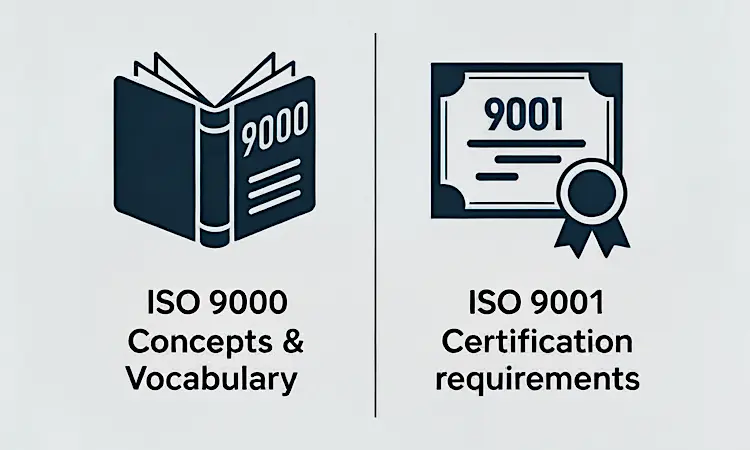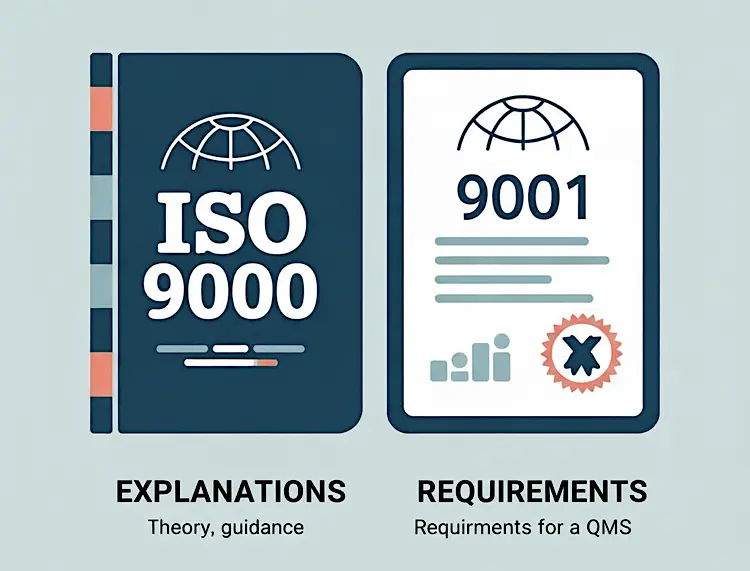ISO 9000 vs 9001: Key Differences Explained
29 September 2023
ISO 9000 vs 9001 is one of the most common comparisons in quality management. Many businesses confuse the two standards, but they serve different purposes. ISO 9000 provides the fundamentals and vocabulary for quality management systems (QMS), while ISO 9001 specifies the actual requirements organizations must meet to get certified.
If your goal is certification, ISO 9001 is the standard you need. At 9001Simplified, we help companies achieve ISO 9001 certification with toolkits, consulting, and training designed for small and midsize businesses.

What Is ISO 9000?
ISO 9000 is a family of standards developed by the International Organization for Standardization (ISO). Specifically, ISO 9000:2015 defines the fundamentals, vocabulary, and core concepts of quality management systems.
The purpose of ISO 9000 is not certification but guidance. It lays out the principles of quality management, such as customer focus, leadership, engagement of people, process approach, improvement, evidence-based decision making, and relationship management.
In simple terms, ISO 9000 is the dictionary and theory behind the ISO 9001 framework. For reference, you can see more about the ISO 9000 family on Wikipedia.
What Is ISO 9001?
ISO 9001 is the world’s most popular quality management standard. It sets the requirements that an organization must meet to demonstrate its ability to consistently deliver products and services that meet customer and regulatory requirements.
ISO 9001:2015 is the current version of the standard. Unlike ISO 9000, organizations can be certified to ISO 9001 by accredited certification bodies. Certification proves to customers, regulators, and stakeholders that your company follows internationally recognized quality management practices.
At 9001Simplified, we provide:
ISO 9001 Certification Toolkit for do-it-yourself implementation
ISO 9001 Certification Service for fast and hands-off certification
ISO 9001 Online Training Courses for employees, managers, and auditors
ISO 9000 vs ISO 9001: The Main Difference
The key difference between ISO 9000 vs ISO 9001 is purpose.
ISO 9000 = Concepts and definitions (guidance, not certification)
ISO 9001 = Requirements for certification (get an explanation of all ISO 9001:2015 requirements.
Think of ISO 9000 as the textbook, while ISO 9001 is the exam you must pass.
Both standards are part of the same family, and ISO 9001 references ISO 9000 for definitions and principles. But only ISO 9001 is used for certification.

ISO 9000 vs 9001 in Business Use
Businesses use ISO 9000 for internal understanding and staff training. It ensures everyone speaks the same quality language. ISO 9001, on the other hand, is used to:
Structure and improve processes
Meet customer expectations
Win contracts that require certification
Comply with regulations
Enhance customer satisfaction
For companies seeking practical benefits and market recognition, ISO 9001 certification is the right choice.
ISO 9001 vs ISO 9000: Which Do You Need?
If you want your business certified, you need ISO 9001. ISO 9000 is not optional, but you don’t need to implement it as a system. Instead, you can reference it for understanding key concepts.
Most organizations only pursue ISO 9001 certification, while ISO 9000 is used in the background for clarification.
ISO 9002 vs 9001: What Changed?
ISO 9002 was once a standard for quality assurance in production and installation. However, it was withdrawn when ISO 9001 was revised in the year 2000. Today, ISO 9001 covers everything ISO 9002 once addressed, so ISO 9002 is obsolete.
When comparing ISO 9002 vs ISO 9001, the conclusion is simple: only ISO 9001 remains valid.
9001 ISO 2008 vs 2015: Key Updates
The ISO 9001:2008 version was replaced by ISO 9001:2015. Companies certified under the 2008 version had to transition by 2018.
Main updates included:
High-Level Structure (aligned with other ISO standards)
Risk-Based Thinking instead of preventive action
Stronger leadership involvement
Greater focus on context of the organization
Improved alignment with service industries
This transition simplified integration with other standards like ISO 14001 and ISO 27001.
ISO 9001 vs ISO 9002
As mentioned earlier, ISO 9002 was merged into ISO 9001. Today, any mention of ISO 9001 vs ISO 9002 refers to history only. Businesses should focus solely on ISO 9001:2015.
TL 9000 vs ISO 9001
TL 9000 is a quality management system developed by the telecommunications industry. It is based on ISO 9001 but adds telecom-specific requirements for performance measurement, service delivery, and supplier relationships.
If you are in telecom, TL 9000 certification may be required. However, ISO 9001 certification remains the global baseline.
QS 9000 vs ISO 9001
QS 9000 was developed by the U.S. automotive industry in the 1990s. It was based on ISO 9001 but customized for auto suppliers. QS 9000 has since been replaced by IATF 16949.
Comparing QS 9000 vs ISO 9001 today shows that ISO 9001 is still active, while QS 9000 no longer applies.
Why Choose ISO 9001 Certification?
ISO 9001 certification brings measurable benefits:
Increased efficiency and reduced waste
Improved product and service consistency
Stronger customer confidence
Access to new markets and contracts
Easier compliance with regulations
Companies across manufacturing, services, technology, and healthcare use ISO 9001 as the global benchmark for quality management.
How to Get ISO 9001 Certified
Achieving certification requires:
1. Gap Analysis of your current processes
2. Documentation of required procedures and controls
3. Implementation of processes and training of employees
4. Internal Audit to test compliance
5. Certification Audit by an external body
This process can be complex, but our ISO 9001 Certification Service provides hands-on support to simplify every step.
ISO 9000 vs 9001: Final Verdict
The verdict is clear: ISO 9000 is the theory, ISO 9001 is the practice. If your goal is certification and business growth, ISO 9001 is what you need.
At 9001Simplified, we offer toolkits, consulting, and training that make ISO 9001 certification fast, simple, and affordable. Start today and position your business for long-term success.


